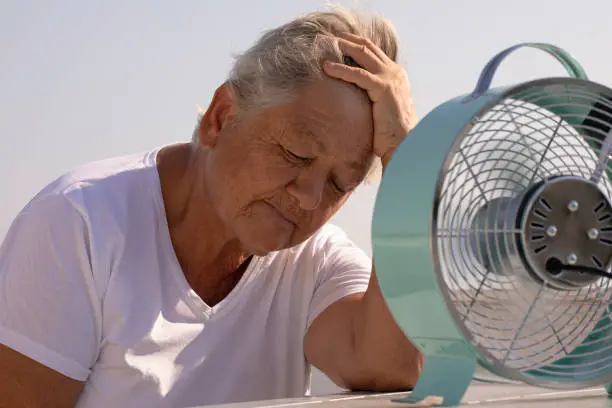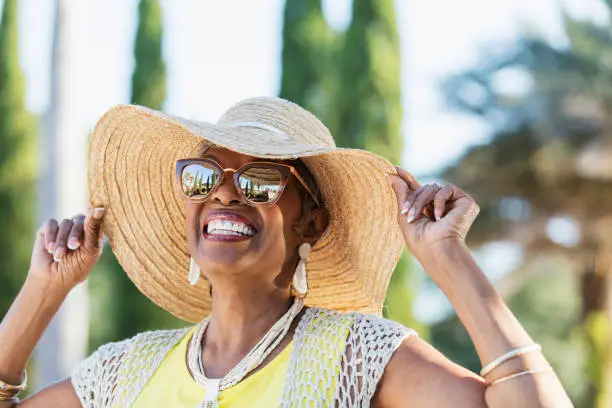Summer and outdoor activities are a match made in heaven. Enjoying the sunshine, going for walks, or simply engaging in outdoor activities feels better under a warm summer sky. However, summer heat and the elderly? Well, not so much as it can pose serious health concerns, such as heat stroke. Without prevention and prompt treatment, this sadly common condition can lead to serious health consequences for our beloved seniors.
Continue reading to better understand how summer heat and the elderly can safely coexist, letting your loved one enjoy the summer fully without any worry.
Why Summer Heat is Especially Dangerous for the Elderly
Age-Related Physical Change
One of the most obvious reasons why summer heat and the elderly sometimes don’t mix well is due to natural changes that come with the aging process. Many seniors experience changes in their ability to regulate body temperature. To make the situation even more complicated, the blood flow to the skin and sweat production may also be reduced, making it more challenging to adjust to sudden temperature increases.
Medical Conditions and Medications
To make matters even worse, around 94.9% of seniors have one chronic disease, like heart disease, diabetes, and kidney disorders, while 78.7% even have more. With those chronic medical conditions that can alter the body’s response to heat in the first place, seniors often need to take medications that also impact normal temperature regulation. Hence, it is no surprise that seniors are at greater risk for heat-related conditions.

Warning Signs to Watch for
Early Signs of Heat-Related Illness
The key to allowing summer heat and the elderly to live side by side safely is to recognize the early signs of heat-related illness before it develops into something more life-threatening. If something feels “off,” don’t ignore it; it could be the body’s first cry for help. Here are some early warning signs to look out for:
- Excessive sweating
- Muscle cramps or weakness
- Dizziness or lightheadedness
- Nausea or vomiting
- Sudden headache
- Fatigue or confusion
Serious Symptoms of Heat Stroke and Heat Exhaustion
When the early signs we mentioned before go unnoticed, heat-related illness can quickly become a medical emergency in seniors. What started as mere heat exhaustion can escalate into heat stroke. Make sure to bring beloved elderly to seek medical attention should these symptoms occur:
- High body temperature (often above 104°F)
- Flushed, hot, or dry skin
- Severe confusion, disorientation, or delirium
- Slurred speech or difficulty speaking
- Seizures
- Loss of consciousness or fainting
- Rapid, shallow breathing
- Weak or racing pulse
How to Stay Safe in the Summer Heat
Stay Cool Indoors
When the day is blazing hot, staying indoors is often the safest option. To help keep the home cool, close curtains during the hottest parts of the day and use air conditioning if available. While fans can provide temporary comfort, they don’t prevent heat-related illness. If there’s no AC at home, take the opportunity to enjoy public places with AC.
Stay Hydrated
Just because the summer heat is here doesn’t mean your aging loved ones have to stay cooped up indoors. With a few precautions, especially staying hydrated, they can still enjoy the outdoors safely. Encourage and remind them to drink water regularly throughout the day, even if they’re not thirsty. Carrying a water bottle, eating hydrating foods like fruits and vegetables, and avoiding coffee or alcohol on hot days can also make a big difference.
Dress Appropriately 
This summer, encourage your senior loved ones to show off those colorful, breezy dresses and shirts. Beyond staying stylish, lightweight and loose-fitting clothing made from breathable fabrics, such as cotton or linen, can help prevent the body from trapping heat. Light-colored outfits also reflect sunlight more effectively than dark ones, keeping the body cooler. When heading outdoors, don’t forget to add sunglasses and a hat for extra protection.
Adjust Daily Routines
While it might be tempting to spend the entire day soaking up the sunshine, seniors should limit their time outdoors when the sun is at its peak, usually between 10 a.m. and 4 p.m. Adjusting daily routines to include outdoor activities during the early morning or late afternoon hours is a safe and innovative choice. Whether it’s walking the dog, gardening, or running errands, doing these activities when it’s cooler can help reduce the risk of heat-related illness.
Benefits of In-Home Care During Hot Weather
When it comes to summer heat and the elderly, in-home care plays a huge role. Professional caregivers are committed to preventing heat-related symptoms from appearing in the first place by encouraging proper hydration and assisting with daily routines, such as selecting appropriate clothing. However, if early signs do occur, they are also trained to monitor and give supportive measures to prevent the condition from worsening.
As a bonus, compassionate caregivers, such as those from Sunny Days In-Home Care Great Lakes, provide companionship that makes the summer season feel even more special.
End Note
Age-related physical changes, chronic medical conditions, medications, and environmental or lifestyle factors all combine to increase seniors’ vulnerability to heat-related conditions. That’s why early recognition of warning signs and implementing preventive measures is so important.
Contact Sunny Days In-Home Care Great Lakes to learn how their dedicated caregivers can help your loved ones beat the heat and enjoy the season safely.

